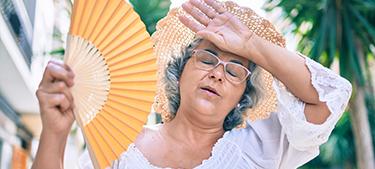For many, summer is the best time of year. It’s filled with long days spent outside crammed full of fun activities. Summer can bring its own challenges when it comes to staying healthy. The summer heat itself can be life threatening.
Heat-linked illnesses are preventable, but more than 600 Americans are killed by high heat each year. It’s important to know the signs of heat illness and what to do to protect your family as you enjoy all summer has to offer.
Heat-Related Illness
Exposure to excessive heat can cause some illnesses and make existing health issues, like heart and respiratory diseases, worse.
Heat-related illness can cause hyperthermia. Hyperthermia happens when the body is not able to cool itself the right way because of high heat. Since the body can’t let go of heat quickly enough, it causes a rapid rise in body temperature. Heat exhaustion and heat stroke are the most serious heat-related illnesses.
Heat Exhaustion
Pay attention to the warnings of heat exhaustion:
muscle cramping
headache
fatigue
vomiting or nausea
fainting or dizziness
What to Do
Go to an air-conditioned place and lie down.
Loosen or remove clothing.
Take a cool bath.
Take sips of cool sports drinks.
Get medical help if symptoms get worse or last more than an hour.
Heat Stroke
Signs of heat stroke include:
body temperature above 103 degrees
red, hot and dry skin with no sweat
rapid, strong pulse
dizziness
confusion or unconsciousness
What to Do
If you see symptoms of heat stroke, call 911 or get to a hospital right away. It’s important that you get treatment quickly. Aggressive fluid replacement and cooling of core body temperature is critical to preventing death. Cool down with any methods on hand until you can get medical help.

Preventing Heat Illnesses
If the weather forecast includes high heat:
Find air conditioning.
Stay in the shade and skip strenuous activities.
Wear lightweight clothing.
Check on friends and family.
Drink plenty of water.
Watch for heat cramps and heat exhaustion or heat stroke symptoms.
Never leave children or pets in a car. Heatstroke can happen in a car when the outside temperature is as low as 57 degrees.
Staying Hydrated
Your body doesn’t work well when it’s low on fluids. You might not know when you’re dehydrated, but it could be the reason for your headache or why you feel tired and lack energy. It’s not something to ignore.
Signs of Dehydration
Thirst is an obvious sign. Many people don't feel thirsty until they're already dehydrated.
Dehydration can cause many symptoms, including:
headache
lightheadedness or dizziness
tiredness
dry mouth
confusion
dark urine (anything darker than pale yellow)
muscle cramps
Constipation
Children may have other warning signs, including fever, diarrhea or vomiting. They may sweat or seem tired when dehydrated. Babies may urinate less, have a dry mouth and make few tears. If you notice any of these signs in your baby, don’t wait to call your child’s doctor. Dehydration in infants can quickly become a serious health issue.
Preventing Dehydration
Drink water throughout the day, whether you feel thirsty or not. It may help to keep track of how much you’re drinking.
You’ve probably heard that you should aim for eight glasses of water per day, but how much water you need depends on your weight, age, level of activity, the climate where you are and other factors. Talk to your Primary Care Provider about how much is right for you.
Keep in mind that not all liquids are hydrating. Drinking water and other liquids that don’t have caffeine, alcohol or sugar is the best way to hydrate. You can give your water a boost with rehydration powders. If you’re working out or being active, especially if it’s hot, drink sports drinks that replace fluids and electrolytes like sodium and potassium that are lost when you sweat.
Other liquids can make it harder to stay hydrated. Drinks that have alcohol or caffeine pull water from your body. And fruit juice and fruit drinks may have too much sugar and too little sodium to provide the best hydration.
Resources for TRS-ActiveCare and TRS-Care
Provider Finder®
Use Provider Finder® to answer any questions and concerns you may have, including how much daily water consumption is right for you.